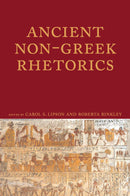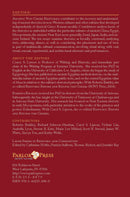Edited by Carol S. Lipson and Roberta A. Binkley
Lauer Series in Rhetoric and Composition
Edited by Thomas Rickert and Jennifer Bay
Information and Pricing
978-1-60235-094-6 (paperback, $30.00); 978-1-60235-095-3 (hardcover, $60.00); 978-1-60235-096-0 (PDF, $19.99) © 2009 by Parlor Press. 316 pages, with notes, illustrations, bibliography, and index
Bookstores: Order by fax, mail, or phone. See our "Sales and Ordering Page" for details.
About This Book
Ancient Non-Greek Rhetorics contributes to the recovery and understanding of ancient rhetorics in non-Western cultures and other cultures that developed independently of classical Greco-Roman models. Contributors analyze facets of the rhetorics as embedded within the particular cultures of ancient China, Egypt, Mesopotamia, the ancient Near East more generally, Israel, Japan, India, and ancient Ireland. The ten essays examine rhetorics as broadly construed, analyzing texts, addressing silence, as well as considering the placement and use of texts as part of multimedia cultural communication, involving ritual along with oral, visual, sensual, experiential, and architectural elements and performances.
Contributors include Roberta Binkley, Richard Johnson-Sheehan, Carol S. Lipson, Yichun Liu, Arabella Lyon, Steven B. Katz, Marie Lee Mifsud, Scott R. Stroud, James W. Watts, Xiaoye You, and Kathy Wolfe.
About the Editors
Carol S. Lipson is Professor of Writing and Rhetoric, and immediate past chair of the Writing Program at Syracuse University. She received her PhD in English at the University of California–Los Angeles, where she began the study of Egyptology. She has published on ancient Egyptian medical rhetoric, on the multimedia nature of ancient Egyptian public texts, and on the central Egyptian value of Maat in relation to the culture’s rhetorical principles. With Roberta Binkley, she co-edited Rhetoric Before and Beyond The Greeks (SUNY Press, 2004).
Roberta Binkley received her PhD in rhetoric from the University of Arizona. Subsequently she has taught at the University of Tennessee at Chattanooga and at Arizona State University. Her research has focused on Near Eastern rhetoric in early Mesopotamia, with particular attention to the works of the priestess and poetess Enheduanna. With Carol S. Lipson, she co-edited Rhetoric Before and Beyond The Greeks.
Contents
Acknowledgments
1 Introduction, Carol S. Lipson
Religious Rhetoric of the Ancient Near East
2 Ritual Rhetoric in Ancient Near Eastern Texts, James W. Watts
3 The Gendering of Prophetic Discourse: Women and Prophecy in the Ancient Near East, Roberta Binkley
4 Rhetoric and Identity: A Study of Ancient Egyptian Non-Royal Tombs and Tomb Autobiographies, Carol S. Lipson
5 The Hebrew Bible as Another, Jewish Sophistic: A Genesis of Absence and Desire in Ancient Rhetoric, Steven B. Katz
Rhetorical Studies of the Ancient Far East
6 Reading the Heavenly Mandate: Dong Zhongshu’s Rhetoric of the Way (Dao), Yichun Liu and Xiaoye You
7 “Why Do the Rulers Listen to the Wild Theories of Speech-Makers?” Or Wuwei, Shi, and Methods of Comparative Rhetoric, Arabella Lyon
8 The Right Use of True Words: Shinto and Shingon Buddhist Rhetoric in Ancient Japan, Kathy Wolfe
Rhetoric from Ancient India
9 Storytelling as Soul-Tuning: The Ancient Rhetoric of Valmiki’s Ramayana. Mari Lee Mifsud
10 Argument in Classical Indian Philosophy: The Case of Śankara’s Advaita Vedānta, Scott R. Stroud
An Ancient Western Non-Greek Rhetoric: Ancient Ireland
11 Orality, Magic, and Myth in Ancient Irish Rhetoric, Richard Johnson-Sheehan
Contributors
Index







